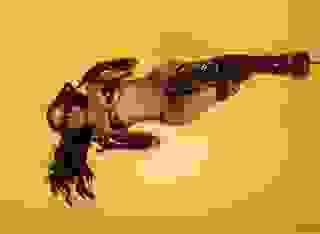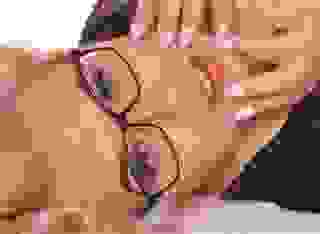- Non-Erotic
- Eleutherios Ch. 04: Demeter
Note: You can change font size, font face, and turn on dark mode by clicking the "A" icon tab in the Story Info Box.
You can temporarily switch back to a Classic Literotica® experience during our ongoing public Beta testing. Please consider leaving feedback on issues you experience or suggest improvements.
Click hereAuthor Note: This is the fourth part of a six-part story retelling the myth of the greek god Dionysus's birth and growth. It is told from six perspectives: those of the children of Kronos and Rhea (in order presented here: Zeus, Hestia, Poseidon, Demeter, Hades, and Hera). In addition to being the story of Dionysus, it is also the story of the six storytellers. The six children of Rhea fought a war against the gods that came before them; here, they lay down their weapons and turn their attention to the future. What follows is a collection of attempts at characterizing the new era. This is not a pornographic text, though it deals with mature themes. I like to think I'm improving my craft, so any ratings and comments--even anonymous--are more than welcome. Thank you for reading this. I love you.
4. Eleutherios Initiated
Or, the Abdication of Demeter
Not all on Oulympos were glad to hear that Dionysos was carrying Poseidon's trident, nor that he had defaced it by replacing its tines with a bunch of grapes, turning the symbol of the ocean's awesome power into a scepter of human hedonism. There were murmurings and mutterings, and without Hestia to tend the household of the gods, toxic gossip spread through our halls.
It was an age of taking. After all, if Dionysos could take Poseidon's trident, why could not any god take whatever they wanted? Amphitrite had taken Poseidon's waters. Hestia had taken herself from Oulympos. Wittingly or no, Zeus had taken the name of Eleusis, seat of my power, and given it to Dionysos--"Eleutherios"--, who had in turn taken my fields for his upstart crop. And, worst of all, Haides had taken my daughter Persephone.
None could blame me, then, for casting about, curious to see what I might take.
But taking, it turns out, is a divine purview, and one we gods have access to on a spectrum of sorts. At one end stands Hermes, god of thieves; on the other, myself, god of provision. It was a strange sensation, trying to tread within the domain of the others. It was as if I simply did not have the time. I would set my eyes on a thing that wasn't mine, and before I could act I was whisked away to Eleusis to oversee my Mysteries, or to some far corner of the world where Triptolemos was spreading my craft. Grain proliferated healthily across the land, and with it went my attention, my divine spark in every kernel.
I considered asking Hermes to steal something for me, to aid me in the redistribution of the world that seemed to be happening constantly since the death of Semele. But something elusive stayed my hand. I sought no aid and took nothing.
During the long months of Persephone's absence, I would recline in the halls of Oulympos, missing my daughter, missing my sister, missing the devotion of my cult, eroded by Dionysos's wine. Everyone knew I was miserable, and it was then that perfect Apollon came to me. He had something to show me, he said. No one turned away from Apollon's demonstrations, and neither did I.
Apollon led me to his chambers. He fiddled a while with some candles and attars on a low table in the corner. Dizzying scents wafted about, lifting me by the nostrils from Oulympos and transporting me to the scene he described in a heady drone.
I found myself in a distant golden land, a mythical place, it seemed, beyond even Okeanus. It was a land of colossal trees, rolling hills, and flowering deserts. It was a land bisected, split in two by a human-engineered aqueduct so grand it could catch the eye of distant Ouranos. It was a land in which I would lose.
The sense of defeat in this vision was overwhelming, at first, an intensification of all the disappointments of the current era, but then it simply became knowledge. Neither good, nor bad. My emotions peeled away from what Apollon was showing me and I observed, impartial, as this land of stewards, this land of provision for its neighbors, slowly replaced its farms and ranches with vineyards. Other pleasure crops bloomed across the golden hills; neither the domain of myself nor of Dionysos but of my future son Ploutos. The land was rich, but it suffered. It hungered. Worse, it thirsted, and neither wine nor the milk of almonds could quench that thirst.
"I do not care," I said through the haze of vatic vapors. "The health of the land is Poseidon's problem."
Apollon shook his head and gave me a look of pity. The air thickened further, and somehow I knew numbers.
Thanks to the brutal machines of human artificers, my cult would dwindle. It wouldn't only lose to Dionysos--the cult of agriculture would become obsolete, more and more rapidly. In three thousand years, a mere 44 of every 100 people would be engaged in agricultural work. Thirty years later, that number would drop to 28. This decline would continue well past the age of gleaming towers and flying machines.
I coughed. The numbers faded as my nostrils cleared and Apollon's room returned to view, but the meaning remained.
"Why are you showing me this?"
"Nothing is forever," Apollon said, sadly. "Our mysteries will fail, our domains trampled by the human propensity to innovate. People will pray to fabricated gods, athletes, and philanthropists."
"So what? We should just let go?"
Apollon shrugged, and then with a wave of his hand dismissed the last of the oracular haze.
"You think we should all do what Hestia did? Just erase ourselves?"
Apollon pulled me into a hug. "I miss her too, Auntie."
I did not return the hug. My arms felt heavy.
My nephew drew back. "Just because I possess the gift of foresight does not mean I have all the answers. I wish I did, but, like you, I lack many of the things I desire."
Perfect Apollon, golden and gallant and always empathetic. I snorted. "You know nothing of my loss."
"Perhaps," he said, and I thought that was going to be the last we spoke of matters. I wished to return to my chambers in solitude, but Apollon had a different idea. He held my hand as he guided me from his rooms. As we walked, he said, sadly, "You believe this to be an age of taking."
I said nothing.
"You believe yourself disadvantaged within our family." My nephew was staring right into my face; I was doing my best to look elsewhere. "Glorious Aunt Demeter, forgive me, but you are wrong. This is not an age of advantage and disadvantage. The humans spin stories of our squabbles, but these stories do not define us. We came before the humans, and we will outlive them--if we can do what the Titans did not."
I found a new emotion welling up within me, a withinness itself: the pain, the trauma of being confined to Kronos's belly, waiting to be rebirthed. The Titans had not wished to share their power.
"Exactly," said Apollon, as if I had spoken aloud. "It is an age of sharing. As our King and Queen share each other freely with unnumbered consorts, as our Dodekatheon now shares power with those who made way for us, so too must we share with each other and those who come after. Your competition with my cousin must end."
Anger flared in me.
"You are wise and well-loved, Apollon, but you presume--"
Apollon shook his head sadly as I realized that he was not, in fact, telling me what to do. The lingering scent of prophecy in my nostrils told me that he was merely stating a fact. The competition would end, eventually, one way or another.
We strode in silence a while.
"Have you spoken with Themis about Persephone?" he asked, as we approached my quarters.
"No one speaks with Themis," I sighed.
"That's a pity," Apollon said. "She is god of Law, and you are god of the humans' laws; if any of us might understand her, I should think it would be you." He gave me a gentle smile, and I felt his care and attention. Few on Oulympos associate me with the gift of order to the cities below, but some may remember that it came to humans in sheaves of corn. Apollon continued, after a pause: "But I seem to have already said too much. Please, Auntie, I wish you only happiness."
There we parted, and that word skittered about my mind. Happiness. I'd been happy with Iaison, making Ploutos. I'd been happy with Zeus, making Persephone. And I'd been happy with Hestia, my elder-younger sister, my best friend. It all felt so long ago. Clearer in my mind was the memory of my last deep depression and the havoc it wreaked on the world in the wake of Persephone's departure. The Moirae coming to me and begging me to relent. I remembered the devastation my mood had wrought upon the land, and I remembered what I was capable of. I did not wish to revisit that cataclysm upon humanity.
I sought Themis. The Titan of Law was ever-present in the halls of Oulympos, so it was not hard to find her, and before I even opened my mouth to greet her, she spoke.
"You believe things could have gone differently," Themis said, in that impossibly non-judgmental tone. "It is not so. You are a god of liminality, and you gave birth to a liminal god. Your child's domain is transition. Your child could no more live out life in its entirety here than in the Underworld."
"A god of liminality?" I asked, choosing to ignore Themis's bizarre refusal to name my daughter.
"You know your domain," Themis said, and it was true.
I was the god of ascent--the ascent of corn, and the ascent of souls. For something to rise, it must start moving. It must change states, passing from dormancy to action, crossing a threshold.
"So Persephone was destined for this dual existence?" I asked.
"Just as Hestia would one day return to flame," Themis said.
I wept.
When my tears dried, it was as if my vision were clearer. My hearing, too. The murmurings and mutterings in the halls were not toxic gossip; they were concern. Hera, in particular, worried for me. Sensing a change following my conversations with Apollon and Themis, they finally approached me directly.
"Eleutherios is a grandchild of Rhea, just as Persephone," Hera said. "He is not your enemy, sister."
But "Eleutherios," alone among the gods, was silent. When he visited the heavens, he gave me a wide berth. And while he traveled the world, growing his strange cult of wine and music and sex, he never came near Eleusis.
"He acts the part," I said to Hera, and Hera fixed me with a withering glare.
"Few gods grow as quick and perfect as Apollon," she reminded me. "Eleutherios remains all but a boy. You feel powerless to defend your cult from his worship, but between the two of you, you are the elder god, the true power. He is afraid of you, sister, for he knows he has displeased you, through no intention of his own."
"Children feel these things," concurred Leto, who sat nursing some demigod or other by the hearth Hestia had once tended.
Hera took my hand in hers. "Think, sister, of those who have borne malice toward you. Do you visit Kronos in his prison? No, you keep a wide berth. Eleutherios sees you in much the same light: ancient, powerful, hostile."
I shuddered at the thought of our paedophage father, the image of his gaping maw and then the interminable, flesh-searing darkness of his stomach. Hera clasped my hand tighter.
"Children feel these things," Leto repeated.
"I did not EAT the child," I objected.
"No," agreed Hera. "You have been milder in your displeasure than our disgraced father. But--"
"Children can feel these things."
"Leto!" Hera and I cried in unison, and then we looked at each other, and suddenly, mirth bubbled forth, and we fell to giggling, holding each other in tight embrace, bodies wracked with laughter.
Leto shook her head and switched the divine babe to her other breast. "Just saying."
Hera kissed me gently on the cheek, and then the forehead, and then the lips. "We love you, Demeter. And Eleutherios might love you too, some day, if you can find it in your heart to love him."
I knew what I had to do, but I was awkward, the sullen queen humans imagine Hera. My attention was so taken up in my billions of kernels that I lacked that easy charisma that so many of my kin possess.
"I can't just say, 'hey, Dio--' or, you know, El, Eleuth... 'Eleutherios, I'm sorry I've been a mean aunt, will you forgive me?'"
"Why not?" asked Hera.
Leto raised an eyebrow, and the fire in the hearth, it seemed, turned to face me.
"It can't be so easy," I insisted. "I need a reason, an occasion--"
Hera cut me off with a finger to my lips, and then smiled conspiratorially. "A mission, perhaps?"
I blinked, and she leaned in and whispered her plan.
The following spring, as I arrived in Eleusis to observe my Mysteries and be reunited with my daughter, I was approached by a young, scantily-clad man, his head wreathed in grapes. He carried a staff laden with the berry, and behind him staggered a parade of intoxicated revelers.
He sized me up without a word, and I him. He was little more than a boy.
"I'm sorry," I said, feeling the tears welling up once more.
His lip trembled, but he said nothing. It was not enough.
"I've been mean," I said. "I felt threatened. As my father before me, and his father before him. But I am Rhea's daughter, and I am loved, and I do not need fear to guide my hand. It is too late to change the past, but starting today I would see you as a nephew rather than a danger."
His cool demeanor broke, and he dropped my brother's erstwhile trident, rushing to hold me.
"Thank you," he said.
I did not ask forgiveness and he did not grant it, but the weight lifted.
I held his pretty face in my weathered hands, and the crone guise I typically wore to Eleusis shed itself as my golden form poured forward. I pulled him close, and kissed him on both of his cheeks, for he was as precious to me as my own child, and I saw in him a fear I recognized. It was the fear my siblings and I had shared--fear of the hostile predecessor.
He became bashful, and I relented, standing back and drawing myself to my full height. The city of Eleusis watched in awe, I am told, as I appeared to them in my most holy form, and my voice apparently boomed across Attica.
"Son of Zeus and Zeus, God of Mad Pleasures, Child and Member of the Olympian Dodekatheon, I shall now acknowledge your name, for I failed to do this whole-heartedly at your birth. You are ELEUTHERIOS, named by your father for your freedom, but also by me, in this instant, after this holy place of Eleusis, in which you have now arrived, a place on the edge of the world, for freedom is nothing without the freedom to arrive, and to go up, and to cross."
Eleutherios cracked a shy smile, and I ushered him into the city. There my cult initiated him into the Eleusinian Mysteries, for the child retained some of his mortal mother's clay and blood, and, unlike the rest of us on Oulympos, he consequently had the potential to visit the domain of Haides.
As the trees budded and Persephone came out of the ground, Eleutherios passed her, descending into the chthonic realm with Hermes at his side. His followers bathed mine in wine and sex, and I carried my daughter back home, where we spent the short summer nights talking by the hearth.
The following winter, as I tended the Olympian flames alone, I thought back to what Themis had said about Hestia, that she now was this flame, and I wondered, idly, who if anyone had lived in the flame back when Hestia tended it.
"There was no flame before Hestia," Themis said, as if I had asked the question aloud. "It was always an extension of her."
Like my grain, or Eleutherios's grapes.
"Or perhaps," continued Themis, speaking slowly, a shade of uncertainty coloring her tone for the first time I could remember, "she was always an extension of it."
- COMMENTS








